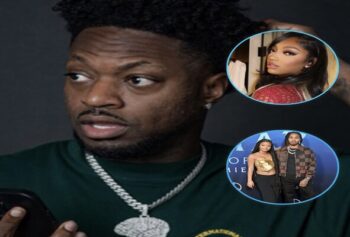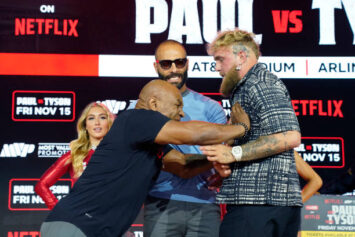It’s often hard to understand what the public wants from Nas. He is undoubtedly one of the true greats that hip hop has ever generated, yet he remains an enigma. His 10th album, Life is Good, dropped last week and, per the usual, it’s filled with the thoughts and stories of a true out of the box thinker. Critical feedback on the album has mostly skewed towards the very positive, with writers championing his cause as one of the last true lyricists left.
Life Is Good is very good actually. It’s well-rounded product and an example of an artist coming to a fully-realized understanding of his world. In hip hop circles there have been few, if any, accounts of parenthood as important or honest as the already classic “Daughters.” Additionally, I have zero plans to take the enchanting “Cherry Wine” off of repeat, while “World Is an Addiction” is profound and moving. “Accident Murderers,” which features Rick Ross, is interesting and slightly unexpected and “Stay” is just a triumph—a determined, moving and eloquent representation of Nas at his highest powers.
However, we’ve been at this moment before – acclaim from the J-School masses and hop purists – but will it sell noteworthy numbers? And more importantly, will it resonate culturally and be felt in the crevices where it’s most needed? Likely the answer is no and no.
We usually blame the artist for their shortcomings, but maybe we didn’t ask the right question. Maybe it’s our fault.
A lot of hip hop fans fall on the alter to praise Illmatic as the greatest album in rap history (rightfully so), yet, we all know that it only sold 59,000 copies in its first week and didn’t go platinum until 2001. The consensus was that, while great, it didn’t have the requisite crossover appeal needed for a full acceptance. This has been a constant of Nas’ career arch.
After his post-Illmatic album – the dope It Was Written – was criticized for succumbing to commercial production trends in an effort to make a bigger splash (glossing over classics like the introspective “I Gave You Power” and the empowering “Black Girl Lost”), Nas’ next two albums — I Am and the rightfully panned Nastradamus – attracted lukewarm responses even if the former did produce several solid records.
And, although, the aimless Jay-Z beef and 2001’s Stillmatic (an inarguable classic, in my opinion) propelled him back into the public consciousness, most of Nas’ catalogue – including ‘02’s reflective God’s Son, the gritty Lost Tapes, 04’s diverse Streets Disciple and ‘08’s criminally slept on Untitled – just never seem to have that universal impact and market saturation.
The complaints are the same each time and usually revolve around the fact that, although it’s very good, Nas’ music is heavy-handed, not always fun and sometimes sonically lacking.
Amanda Seales, who co-hosts the MTV show Hip Hop POV, sums it up in this way: “Beat selection is a huge reason why he isn’t more commercially successful. He’s never been able to put together an album that is sonically cohesive since It Was Written,” she contends. “I’m a ginormous Nas fan, but it’s always this kind of piecemeal of records.”
Certainly no one can argue that Nas has consistently supreme taste in track selection, but that’s not the reason why his music doesn’t transcend the way other artists have during his era.
Nas doesn’t make superhero music. His music is usually too grounded, too literal, cutting too close to home. Folks want to fantasize and imagine themselves in a more glorious state. Nas puts out songs like this occasionally, but the majority of his discography is filled with songs that challenge the listener.
Even though his 2006 album Hip Hop Is Dead underwhelmed, Nas did strike a nerve with large segments of hip hop’s fan base. The consistent glorification of money and violence seemed overboard at the time and people began yearning for pushback against the kind of ignorant and exploitive music that tends to dominate. The problem is that this is actually just a theoretical pushback.
This is where Nas loses.
People say they want change, but the numbers don’t bear it out. It’s just something that folks say in public, to sound urbane and progressive. But as soon as they’re in private, they are playing the latest tale of gun-bucking, hole-in-your dome, Latin American cartel referencing, community-deprivation reinforcing music they can find.
This is not an argument about whether violent/sexist music influences behavior (personally, in limited aspects, I say yes), because that’s beside the point. It’s not even a conversation specifically criticizing that kind of music — this is about balance.
In Black communities across the country there have always been conversations about the need for more role models and how that deficit helps explain the high rates of poverty and violence that usually define low-income areas. Nobody can say definitively whether or not external stimulants – like music – effect behavior, but it certainly doesn’t help. In a year like 2012 – in which we’ve seen violence spike in cities like Chicago and New York – these discussion take on extra relevance. People want answers to the issues and, right or wrong, people look to pop culture.
Here’s something that won’t shock you, though: hip hop, by and large, doesn’t grow with you. It’s everything in high school and but as you get a little older, lyrically, it begins to diverge from your life. It doesn’t feel concrete and that’s one of the things that keeps the music from being a true barometer of the full Black experience. Eighty percent of these dudes are all eating off of the same four food groups—Drugs, Sex, Guns and Money.
Everything else is just a derivative of those topics, never more than a few bars away from a direct correlation with the “live fast/die young” lifestyle. God forbid you want to hear a song about how the rest of the world operates or about the actual, everyday trials and tribulations of life. All that ever leads to is a bunch of people getting intimidated and throwing the “conscious rap” label on it…and we all know “conscious rap” is just another way of saying “don’t buy it.”
Part of the mythos that permeates throughout mainstream rap is this premise that, somehow, we’re missing out, that the grass is greener on the other side, that life is more amazing for those people across the street or across town. There have been myriad studies, articles and books discussing the complexities between middle, working and poverty class African-Americans; some of it detailing the guilt of the well-to-do in facing the fact that they don’t share the economic struggles of their inner city brethren. These folk can adopt the look and co-opt the slang, but they don’t accept the responsibility to try and remedy the situation. Songs about drug culture? Sure, bring it on, so long as I don’t actually ever have to be in the line of fire. Maybe that’s too much of a burden for middle class Black folks to deal with…but if not them, then who exactly? The Democratic Party?
If your house is in disarray, then it’s up to you to clean it up. John Lewis didn’t get his face stomped-in on Edmund Pettus Bridge so that you can sit around and “party & BS” and pretend everything is on the up and up.
Ironically, the people who actually live in the inner city, those who actually struggle with economics in a non-linear fashion – they look at middle-class Black Americana with longing desire. They want the two car garage, the family dentist and the trips to Oak Bluffs. True, they may criticize them and throw around dismissive words like “bourgie,” but it’s all love. That’s why they adopt the same aspirational lifestyle and obsessively name drop brands like Lanvin and Louie Vuitton and Murcielago, like those things actually are attainable to people getting by on net incomes of less than 20K a year.
These types think attaching “hood” to anything somehow makes it better, more legit. It’s a bizarro stance where everyone claims the hood and then exploits it for everything that it’s worth. We all know the ghetto sucks, yet we use it like a currency – the more of it you have, the more respect deemed upon you. Sure some artists really do give back, but a lot of them just throw a few basketball tournaments or maybe take a photo at a community center in some forsaken public housing project. But the real, tangible way artists can impact fans – via their music – well, that’s a no go.
It’s the height of hypocrisy (and cowardice) for a dude who just got out the projects to write lyrics making light of the people still trapped there. It’s a selfish existence and shows zero empathy. And yet, “These Are Our Heroes.”
This is where Nas’ music comes in, or at least should. His versatility is his biggest strength and biggest weakness, which makes his music fascinating to core constituencies, yet unappealing to causal fans.
Ideally his albums would be the meeting point, his songs the conduit for the working, impoverished and middle classes to coalesce. His topics run the gamut from American history, to politics, to community empowerment to just plain old street talk. All of it delivered with intelligence and sincerity and, yet, every couple of years, fans have to be reminded that is Nas still relevant.
“More people like Nas is what hip hop needs, but you don’t hear him on the radio like you hear an YMCMB or a Maybach Music Group,” says Alvin “Aqua” Blanco, the deputy editor of popular music site Hip Hop Wired. “The people who need to hear it usually don’t, so it’s always sex and drugs because that’s what people are drawn towards. Nas does a good job, but he’s always gonna be fighting a losing battle on that.”
It’s a style vs substance argument that fans haven’t settled, yet. And they might not figure it out, at least not until Nas finally retires and the next lyrical dude that doesn’t sell comes on the scene. Other genres have this too, so it’s not specific to hip hop, but the stakes are much higher. Whether we want to admit or accept it, this music and its legacy belong to our community and it would be nice if we would reward the artists who actually put our interests first.
Billboard is predicting that it will hit number one, which is cool I guess, but really I’m not impressed. Nas’ last joint debuted at No. 1 as well and its impact was crazy slight. What Life Is Good needs to do is pulsate throughout the country, be the all-encompassing musical moment of quality music that everybody says they want. If that happens then we’ll know that the overall Hip Hop community is ready to realize its manifest destiny. No more talking about it and not being about it facades, no more fake roundtable debates and no more pointing the finger at everyone but us. Otherwise just shut up about the state of hip hop and get back to what you usually do – thugging out your Spotify playlist so your cubicle mates will think you’re hard.



